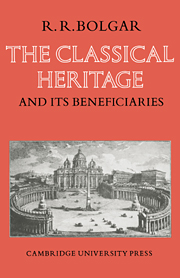Book contents
- Frontmatter
- Contents
- Preface to 1973 impression
- Introduction
- Chapter I The Background
- Chapter II The Greek East
- Chapter III The Carolingian Age
- Chapter IV The Pre-scholastic Age
- Chapter V The Scholastic Age
- Chapter VI Collapse and New Beginnings
- Chapter VII The High Renaissance
- Chapter VIII The End of the Renaissance and the Appearance of New Patterns in Classical Education and Scholarship
- Chapter IX Education and the Classical Heritage
- Notes
- Appendix I Greek MSS. in Italy during the Fifteenth Century
- Appendix II The Translations of Greek and Roman Classics before 1600
- Index
Chapter II - The Greek East
Published online by Cambridge University Press: 29 January 2010
- Frontmatter
- Contents
- Preface to 1973 impression
- Introduction
- Chapter I The Background
- Chapter II The Greek East
- Chapter III The Carolingian Age
- Chapter IV The Pre-scholastic Age
- Chapter V The Scholastic Age
- Chapter VI Collapse and New Beginnings
- Chapter VII The High Renaissance
- Chapter VIII The End of the Renaissance and the Appearance of New Patterns in Classical Education and Scholarship
- Chapter IX Education and the Classical Heritage
- Notes
- Appendix I Greek MSS. in Italy during the Fifteenth Century
- Appendix II The Translations of Greek and Roman Classics before 1600
- Index
Summary
Roman education under the Empire used to emulate the god Janus in looking two ways at once; and schoolboys were expected to acquire a simultaneous knowledge of Latin and Greek. A smaller state could not have been so prodigal of human effort. In the ages to which we turn now, which lie between antiquity and the Renaissance, East and West having parted company in politics saw no reason why they should labour to maintain a difficult cultural concord. The West gave its mind to Latin and neglected Greek. It met Greek books only in translation, or in the libraries of the supremely erudite; while in the East the Byzantines, who used Greek currently, knew no Latin at all. The two halves of Europe were thus educationally distinct. They must be studied separately; and for reasons which will appear later, it is convenient to take the East, that is Byzantium, first.
The world whose brightest stars were Photius, Psellus and Anna Comnena inevitably presents a number of strange features: and the causes of its educational pre-eminence and its educational failures must be sought in the action of somewhat unexpected factors.
The wealth of Byzantium made it the target of constant attacks. Its domains were ringed by enemies who fought now singly, now in alliance, but who were never quiet. Generally, they were held at bay; but from time to time, as the movements of peoples drew reinforcements into the battle, the assailants were in a position to outclass the defence; and the Byzantine State had to look for survival to the circumstance that its territories, originally very large, were criss-crossed by natural ramparts.
- Type
- Chapter
- Information
- The Classical Heritage and its Beneficiaries , pp. 59 - 90Publisher: Cambridge University PressPrint publication year: 1973



